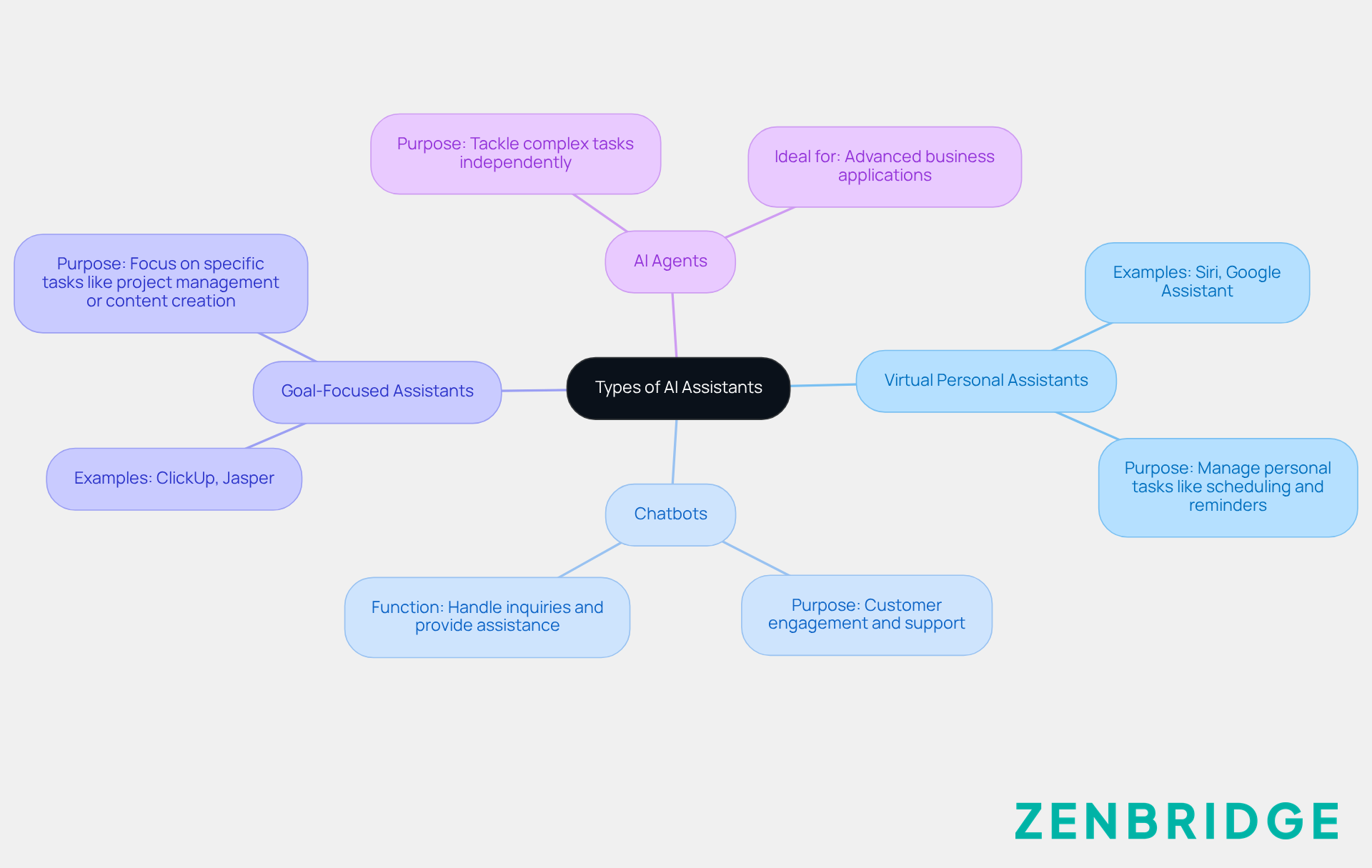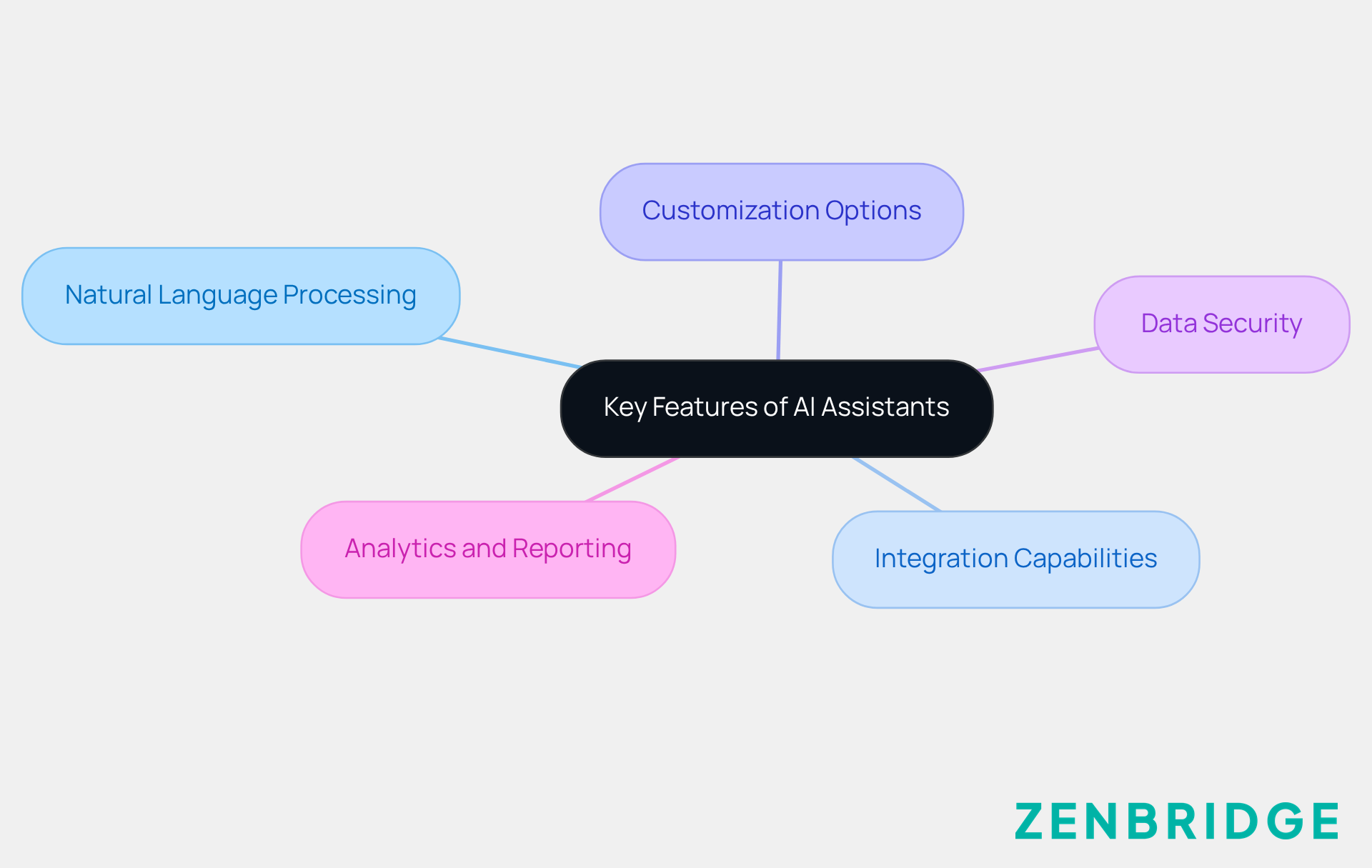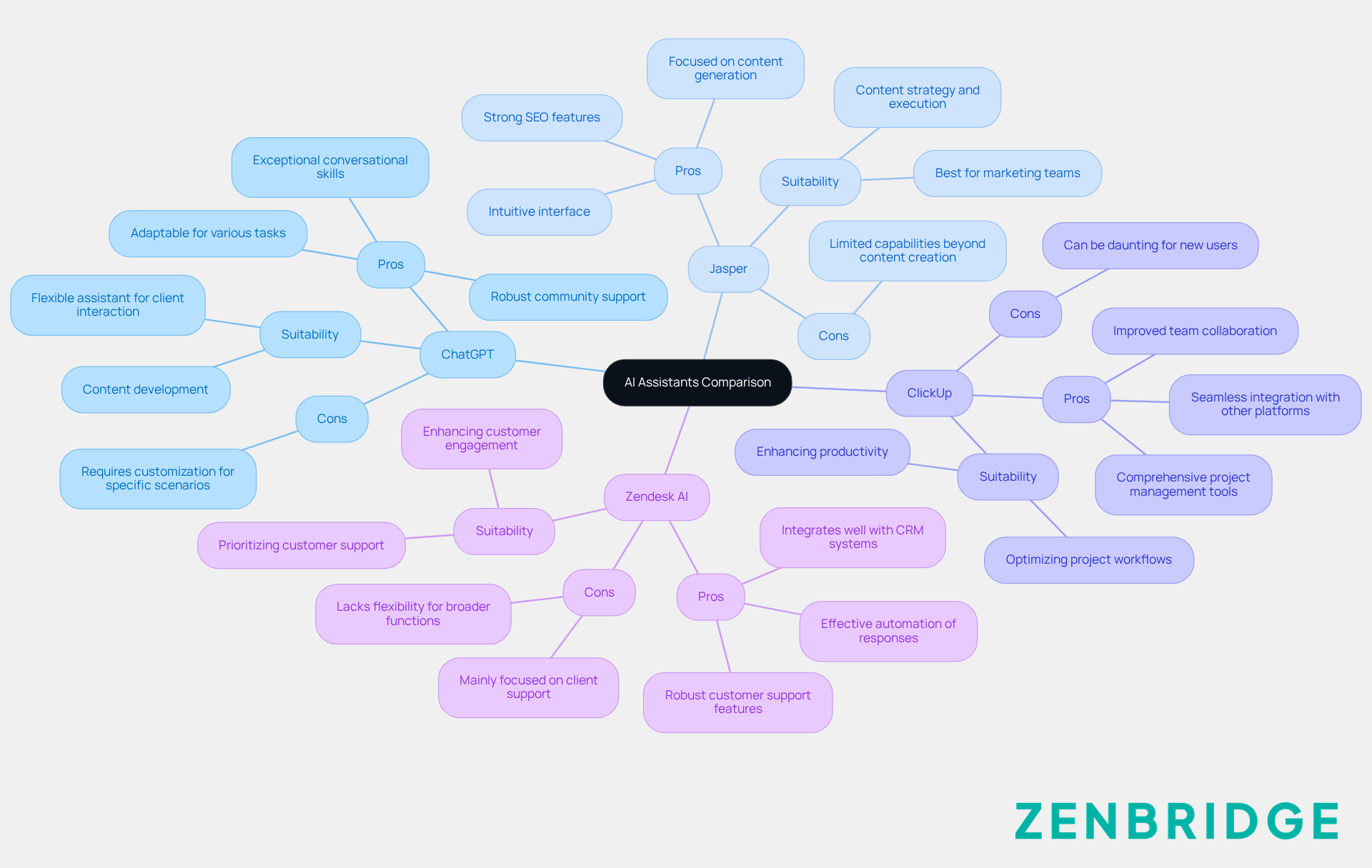
Comparative Analysis of the Best AI Assistant for Small Businesses

Key Highlights:
- AI assistants utilise technologies like natural language processing (NLP) and machine learning (ML) to enhance productivity by managing tasks and customer interactions.
- Types of AI assistants include Virtual Personal Assistants (VPAs), chatbots, goal-focused assistants, and AI agents, each serving unique business needs.
- Key features to consider when selecting an AI assistant include NLP capabilities, integration with existing tools, customization options, data security, and analytics.
- Comparative analysis of leading AI assistants: ChatGPT is versatile for client interaction; Jasper excels in content creation; ClickUp focuses on project management; Zendesk AI specialises in customer support.
- Choosing the right AI assistant requires assessing their pros, cons, and suitability for specific business applications.
Introduction
Hey there! AI assistants are really shaking things up for small businesses, turning those tedious tasks into smooth processes that boost productivity and keep customers engaged.
As these smart tools keep evolving, it’s super important for business owners to get a handle on their different functions and capabilities if they want to streamline operations.
But with so many options out there, you might be wondering which AI assistant is the best fit for your specific needs.
Let’s dive into a comparative analysis of some leading AI assistants, checking out their unique strengths and weaknesses to help you make informed decisions.
Understanding AI Assistants: Definition and Functionality
AI programmes are pretty cool software tools that use artificial intelligence technologies like natural language processing (NLP) and machine learning (ML) to help us out. They can take care of repetitive tasks, manage our schedules, and even assist with customer interactions. This means we can boost our productivity and efficiency.
Now, if you're a small business owner, you might find that the best AI assistant can be a game changer. They can handle inquiries, organise appointments, and keep an eye on data, allowing you to focus on what really matters. Their abilities range from simple task execution to more complex decision-making, establishing them as the best AI assistant for various business needs. So, what do you think? Ready to explore how AI can make your life easier?
Types of AI Assistants: Exploring Categories and Use Cases
Let’s dive into the different types of tools, including the best AI assistant available out there. They can be grouped based on what they do and how we use them. Here are some common categories you might find interesting:
- Virtual Personal Assistants (VPAs): Think of Siri or Google Assistant. These handy helpers are great for managing your personal tasks, like scheduling and reminders.
- Chatbots: These are designed for customer engagement. Chatbots can handle inquiries and provide assistance, making them a perfect fit for organisations looking to boost their customer service.
- Goal-Focused Assistants: These specialised tools focus on specific tasks, like project management or content creation. Tools like ClickUp and Jasper are great examples.
- AI Agents: Now, these guys are a bit more independent than your usual helpers. AI agents can tackle complex tasks without needing constant user input, which makes them ideal for advanced business applications.
Each of these categories serves a unique purpose, helping businesses choose the best AI assistant based on their needs. So, what do you think? Any particular type of AI tool that catches your eye?

Key Features of AI Assistants: What to Look For
When you're on the hunt for an AI assistant, there are a few key features you definitely want to keep in mind:
- Natural Language Processing (NLP): This one's a must! The ability to understand and process human language is crucial for effective communication.
- Integration Capabilities: Look for a support tool that can seamlessly integrate with your existing tools and platforms. It really helps boost workflow efficiency.
- Customization Options: You’ll want the ability to tweak the functionalities of your assistant to fit your specific needs. This can really enhance your user experience.
- Data Security: Don’t overlook this! Ensuring that your assistant complies with data protection regulations is vital for keeping customer trust intact.
- Analytics and Reporting: Features that provide insights into usage patterns and performance can really help you optimise your operations.
These features are what enable the best AI assistant to be effective in supporting your business processes and boosting productivity. So, what do you think? Ready to dive deeper into finding the right fit for you?

Comparative Analysis of Leading AI Assistants: Pros, Cons, and Suitability
In this comparative analysis, let’s dive into several leading AI assistants tailored for small businesses:
-
ChatGPT:
- Pros: Exceptional conversational skills, adaptable for various tasks, and backed by a robust community.
- Cons: May require customization for particular operational scenarios.
- Suitability: Perfect for organisations looking for a flexible assistant for client interaction and content development.
-
Jasper:
- Pros: Focused on content generation, boasts an intuitive interface, and offers strong SEO features.
- Cons: Limited capabilities beyond content creation.
- Suitability: Best suited for marketing teams concentrating on content strategy and execution.
-
ClickUp:
- Pros: Comprehensive project management tools, seamless integration with other platforms, and improved team collaboration.
- Cons: Can be daunting for users unfamiliar with project management software.
- Suitability: Ideal for teams aiming to optimise project workflows and enhance productivity.
-
Zendesk AI:
- Pros: Robust customer support features, automates responses effectively, and integrates well with CRM systems.
- Cons: Mainly concentrated on client support, lacking flexibility for wider organisational functions.
- Suitability: Ideal for companies prioritising customer support and engagement.
By assessing these assistants based on their strengths, weaknesses, and specific applications, businesses can make informed decisions to select the best AI assistant that suits their needs. You might be wondering which one fits your business best—let’s keep the conversation going!

Conclusion
Exploring AI assistants really shows how they can transform small businesses. By using cool technologies like natural language processing and machine learning, these tools can boost productivity and streamline operations. When you pick the right AI assistant, you can focus on what you do best while managing tasks, communication, and customer interactions more efficiently.
In this article, we’ve looked at different types of AI assistants, like Virtual Personal Assistants, Chatbots, Goal-Focused Assistants, and AI Agents. Each one has its own unique purpose, catering to various business needs. We highlighted key features such as integration capabilities, customization options, and data security as crucial factors in choosing the best AI assistant. Plus, we did a comparative analysis of leading AI tools like ChatGPT, Jasper, ClickUp, and Zendesk AI, showcasing their specific strengths and weaknesses to help you make informed decisions.
So, let’s wrap this up: the importance of AI assistants for small businesses is huge. As technology keeps evolving, embracing these tools can really enhance your operational efficiency and give you that competitive edge in the market. I encourage you to think about your unique needs and cheque out the best AI assistants available to unlock your full potential and drive success in the years to come. What do you think? Ready to dive in?
Frequently Asked Questions
What are AI assistants?
AI assistants are software tools that utilise artificial intelligence technologies, such as natural language processing (NLP) and machine learning (ML), to perform tasks and assist users.
What functionalities do AI assistants offer?
AI assistants can handle repetitive tasks, manage schedules, assist with customer interactions, and perform both simple task execution and complex decision-making.
How can AI assistants benefit small business owners?
For small business owners, AI assistants can manage inquiries, organise appointments, and monitor data, allowing them to focus on more important aspects of their business.
What impact do AI assistants have on productivity and efficiency?
AI assistants can boost productivity and efficiency by automating routine tasks and streamlining operations, enabling users to allocate their time and resources more effectively.

